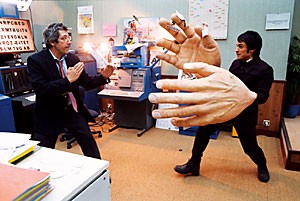“”The Science of Sleep”” is yet another one of those teeny-tiny films that may be impossible to find (seeing as how El Con is the only place that’s playing it), but it’s well worth hunting down.
Stephane (Gael Garcia Bernal) has returned to France after the death of his father. While he’s getting re-adjusted to being back, Stephanie (Charlotte Gainsbourg) moves into the apartment across the hall from him.
Both of them live for invention and build up lies to make their lives seem more exciting than they really are, leading to the awkwardly comic fact that Stephane can’t confess he’s actually her neighbor. Despite all the confusion, Stephane and Stephanie both find themselves attracted to each other because they recognize something of themselves in each other.
However, Stephane has an overactive imagination. His daydreams often include elements of his real life, mixed in with fantasies and dream images. This can be confusing for him, and often he becomes unsure of where the dreams stop and the concrete begins.
One night, he sabotages his relationship with Stephanie in a dream, but then wakes up to realize that he actually followed through with it in reality. The rest of the movie follows Stephane’s struggle to differentiate what parts are genuine and what are make-believe.
The plotline may not seem like the most unique out there (boy meets girl, boy loses girl, boy tries to win girl back, etc.), but the fantasy sequences ensure that “”The Science of Sleep”” transcends that. In the hands of anyone but director Michel Gondry, the dreams would have been juiced up by special effects that would have completely ruined it.
Instead, he keeps the effects simple, making the movie seem actually dreamlike. We don’t dream in lasers and killer robots; our dreams are hazy. The dream land in Stephane’s head is made of cardboard and cotton balls, nothing fancy. It is simple and creative, just the way it should be.
It is these simple effects that truly steal the show. Since Stephane eases in and out of his fantasy land quite frequently, the thrill of never knowing what sort of thing will set off his crazy visions keeps you excited. Even something as simple as shaving with a razor can trigger the next set. The content of these hallucinations are incredibly innovative as well. Each one is completely random and bizarre; none ever play out the same way and they are completely outlandish in the most hilarious way possible.
“”The Science of Sleep”” is so sincere about its odd-ball quality and completely owns its eccentricity in a way that almost rivals Gondry’s last film, “”Eternal Sunshine of the Spotless Mind.”” It’s only a matter of time before the indie hipsters are adding this to the list of their favorite movies on Facebook to show how cool they are.









